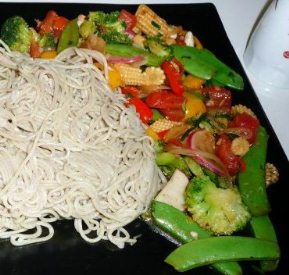This is a post that was originally published in Healthy and Fit Magazine in their Dec 2012 issue. Karen Giles-Smith RD , a writer and colleague called me to pick-up my thoughts. It was an interesting discussion on how certain foods such as saturated fats, so called healthy foods could cause increase in free radicals leading to inflammation and how certain foods can help to turn off inflammatory markers. We also discussed if dietary advice needs to be individualized or do I promote a specific kind of a diet to all my clients, such as a Paleo diet or a Mediterranean diet. What I like to do in my practice is pick up the best of all “so-called diets”, check for scientific validity, look at my clients likes and cultural needs, identify food sensitivities , nutrient deficiencies, disease progression and then make a final verdict.
Hope you enjoy reading this article as much as I enjoyed sharing my thoughts.
Internal inflammation wreaks havoc: Here’s what you can do about it.
At this very moment, your body is working hard to protect itself from invaders such as harmful bacteria, viruses and toxins. When your immune system detects invaders or the infection or injury they cause, it defends and heals itself by sending plasma and white blood cells to the area, resulting in inflammation: swelling, redness, heat and sometimes pain.
Under normal circumstances, inflammation is helpful to health. But sometimes, the immune system goes awry and inflammation lasts too long, leading to wear and tear on body cells. Research indicates that long-term, or chronic, inflammation plays a significant role in many diseases including type 2 diabetes, rheumatoid arthritis, heart disease, cancer and stroke.
Genetics may increase the likelihood of chronic inflammation. In addition, inflammation may be triggered by certain factors such as stress, food additives, food allergies and sensitivities, and overuse of antibiotics, explains Aarti Batavia, MS, RD, certified LEAP (Lifestyle Eating and Performance) practitioner and functional medicine practitioner in private practice in Novi and Ann Arbor. “When these factors trigger the immune system, the gut may be compromised causing the release of inflammatory chemicals/markers which can then cause chronic inflammation in other parts of the body.” Batavia’s practice focuses on identifying food triggers and “healing the gut” using a multidisciplinary approach.
Can you help prevent or control chronic inflammation? According to many experts, you can—by maintaining a healthy weight, not using tobacco, managing stress, getting enough sleep, exercising and eating a well-balanced diet including foods with anti-inflammatory properties.
 Maintaining a healthy weight and getting regular physical activity are two of the most effective ways to control inflammation. Research suggests that too much body fat, particularly fat in the abdominal area, can produce high levels of the proteins that trigger inflammation. “Staying fit preserves joint health and promotes health in general,” says Fred J. Van Alstine, MD, MBA, family physician in Owosso and president-elect of the Michigan Academy of Family Physicians.
Maintaining a healthy weight and getting regular physical activity are two of the most effective ways to control inflammation. Research suggests that too much body fat, particularly fat in the abdominal area, can produce high levels of the proteins that trigger inflammation. “Staying fit preserves joint health and promotes health in general,” says Fred J. Van Alstine, MD, MBA, family physician in Owosso and president-elect of the Michigan Academy of Family Physicians.
Another powerful inflammation-fighter is eating well. Research suggests that bioactive components in fruits, vegetables, and whole grains may regulate or moderate inflammatory and immunological processes. “The American diet is calorie-rich and nutrient-poor,” says Van Alstine. “It’s back to basics: A healthy diet including fruits and vegetables in order to get adequate nutrients and antioxidants. I tell my patients ‘brown is better’: Limit white flour, white fat, white sugar and salt. You can consume them, but in moderation. Portion control is key to keep calories in check.”
Many experts recommend a Mediterranean-style eating plan to help control inflammation, which is a plant-based diet with plenty of fruits, vegetables, whole grains, beans, legumes, healthy fats including olive oil and nuts, herbs and spices, at least two seafood meals per week, and small amounts eggs, yogurt and cheese. Experts also recommend eating less red meat, processed meat, fried foods, sweets and refined grains.
Healthy fats are a key component of a Mediterranean-style diet. Substantial research indicates that omega-3 fats, particularly those found in coldwater fish, produce chemicals that inhibit inflammation. Omega-3 fatty acids are a type of polyunsaturated fatty acid. They are essential, which means the body can’t produce them, so we need to get them from the food we eat. In addition to fatty fish, omega-3 fats are also found in leafy greens, whole grains, walnuts, seaweed, beans and legumes, chia seeds, flaxseeds, and canola oil.
The overall effect of omega-6 fatty acids on inflammation is controversial. Most experts believe that Americans shouldn’t eat more of the foods high in omega-6 fatty acids and some experts recommend eating less. Omega-6 fatty acids are another type of essential, polyunsaturated fatty acid and are found in cottonseed, sunflower, safflower, soybean and corn oils.
 Batavia believes that nutrition recommendations must be individualized and therefore doesn’t recommend one particular eating plan. “People have different likes and dislikes and sensitivities,” she explains. “For example, turmeric [a spice] is anti-inflammatory but some people can’t tolerate it.” For most people, however, Batavia recommends checking blood levels of vitamin D, B-12 and zinc, balancing intake of omega-3 and omega-6 fats through food and supplements, adding probiotic-containing foods such as yogurt, kefir, kimchee and sauerkraut, avoiding sugary foods and fats (other than nuts and olive oil) and eating fewer processed foods.
Batavia believes that nutrition recommendations must be individualized and therefore doesn’t recommend one particular eating plan. “People have different likes and dislikes and sensitivities,” she explains. “For example, turmeric [a spice] is anti-inflammatory but some people can’t tolerate it.” For most people, however, Batavia recommends checking blood levels of vitamin D, B-12 and zinc, balancing intake of omega-3 and omega-6 fats through food and supplements, adding probiotic-containing foods such as yogurt, kefir, kimchee and sauerkraut, avoiding sugary foods and fats (other than nuts and olive oil) and eating fewer processed foods.
“Take charge of your health,” says Van Alstine. Ultimately, people keep themselves healthy, not healthcare providers, he says. “What you do to yourself and for yourself is more important than what I can do as a doctor.”
So what do you think, would you follow a Mediterranean diet or rather individualize your nutrition plan as per your needs? Let me help you with your nutrition plan.
